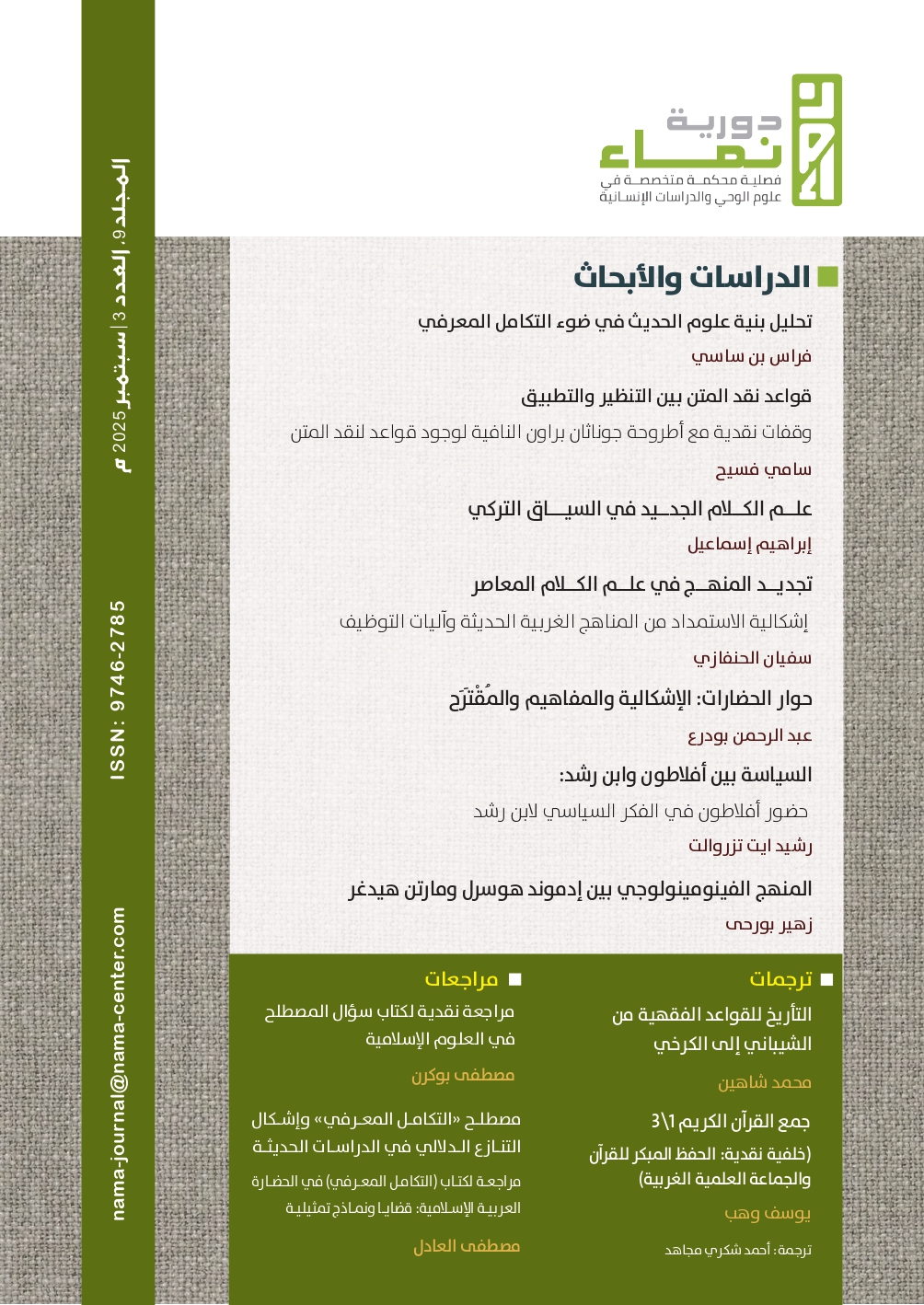The Phenomenological Method between Edmund Husserl and Martin Heidegger
Abstract
This study seeks to clarify certain ambiguities surrounding phenomenology, particularly regarding the widespread assumption that Heidegger’s role in philosophical history is rooted in his association with the Husserlian school. However, his engagement with Husserl was methodological rather than doctrinal. Heidegger did not aim to resolve the philosophical dilemmas that hindered Husserl or to complete the phenomenological project. Instead, he sought to establish a distinct intellectual trajectory—one that appropriated phenomenological method solely to recover and revitalize inquiry into the long-neglected question of being. This motivation underpins the structure of the study, which comprises an introduction and three chapters. The first examines Heidegger’s view of the history of philosophy as a deviation from its foundational concern—the quest for the truth of being. The second chapter addresses his critique of Husserl, whom he saw as contributing to this deviation. The final chapter explores Heidegger’s implementation of the phenomenological method as a novel framework for interpreting human existence. The study concluded that Heidegger’s phenomenological approach became intertwined with hermeneutics, ultimately giving rise to a distinct orientation known as interpretive phenomenology.
Full text article
References
توفيق، سعيد، (1992)، الخبرة الجمالية: دراسة في فلسفة الجمال الظاهراتية (الطبعة 1)، المؤسسة الجامعية للدراسات والنشر والتوزيع.
الدّواي، عبد الرزاق، (1992)، موت الإنسان في الخطاب الفلسفي المعاصر: هيدغر، ستروس، فوكو (الطبعة 1)، دار الطليعة.
ريكور، بول، (2005)، صراع التأويلات (ترجمة منذر عياشي)، دار الكتاب الجديد المتحدة.
سليمان، جمال أحمد، (2009)، هيدغر: الوجود والموجود (إشراف أحمد عبد الحليم عطية)، دار التنوير.
الشيخ، محمد، والطائري، ياسر، (1996)، مقاربات في الحداثة وما بعد الحداثة: حوارات منتقاة من الفكر الألماني المعاصر (الطبعة 1)، دار الطليعة.
الشيكر، محمد، (2006)، هيدغر وسؤال الحداثة، دار إفريقيا الشرق.
غادامير، هانز جورج، (2007)، الحقيقة والمنهج: الخطوط الأساسية لتأويلية فلسفية (ترجمة حسن ناظم وعلي حاكم صالح، مراجعة جورج كتوره)، دار أويا.
غراندان، جان، (2007)، المنعرج الهرمنيوطيقي للفينومينولوجيا (ترجمة عمر مهيبل)، منشورات الاختلاف.
قارة، نبيهة، (1998)، الفلسفة والتأويل (الطبعة 1)، دار الطليعة.
المسكيني، فتحي، (2005)، نقد العقل التأويلي أو فلسفة الإله الأخير (الطبعة 1)، مركز الإنماء القومي.
المصدق، إسماعيل، (2008)، المحطات الأساسية لفينومينولوجيا هوسرل، مجلة مدارات فلسفية، (4)، الجمعية المغربية الفلسفية.
مصطفى، عادل، (2007)، فهم الفهم: مدخل إلى الهرمنيوطيقا، نظرية التأويل من أفلاطون إلى غادامر (الطبعة 1)، دار رؤية.
ميرلوبونتي، موريس، (1983)، تقريظ الفلسفة (ترجمة قرحيا خوري)، منشورات عويدات.
هايدغر، مارتن، (2012)، الكينونة والزمان (ترجمة وتعليق فتحي المسكيني، مراجعة إسماعيل المصدق)، دار الكتاب الجديد.
هيدغر، مارتن، (2003)، أصل العمل الفني (ترجمة أبو العيد دودو)، منشورات الجمل.
هيدغر، مارتن، (2015)، مدخل إلى الميتافيزيقا (ترجمة عماد نبيل)، دار الفارابي.
هيدغر، مارتن، (1977)، نداء الحقيقة (ترجمة وتقديم عبد الغفار مكاوي)، دار الثقافة.
Arabic References:
Ben Sebaa, Mohamed, (2015), Tahawwulat al-faynūmīnūlūjiyā al-muʿāṣira: Merleau-Ponty fī muwājaha Husserl wa Heidegger (1st ed.), Al-Markaz Al-ʿArabī li-l-Abḥāth.
Tawfiq, Saʿid, (1992), Al-khibra al-jamāliyyah: Dirāsa fī falsafat al-jamāl al-ẓāhirātiyya (1st ed.), Al-Muʾassasa Al-Jāmiʿiyya li-l-Dirāsāt wa-l-Nashr wa-l-Tawzīʿ.
Al-Dawwī, ʿAbd al-Razzāq, (1992), Mawt al-insān fī al-khiṭāb al-falsafī al-muʿāṣir: Heidegger, Strauss, Foucault (1st ed.), Dār Al-Ṭalīʿa.
Ricoeur, Paul, (2005), Ṣirāʿ al-taʾwīlāt (Trans. Mundhir ʿAyyāshī), Dār Al-Kitāb Al-Jadīd Al-Muttaḥida.
Sulaymān, Jamāl Aḥmad, (2009), Heidegger: Al-wujūd wa-l-mawjūd (Supervised by Aḥmad ʿAbd al-Ḥalīm ʿAṭiyya), Dār Al-Tanwīr.
Al-Shaykh, Muḥammad & Al-Ṭāʾirī, Yāsir, (1996), Muqārabāt fī al-ḥadātha wa mā baʿd al-ḥadātha: Ḥiwārāt muntakha min al-fikr al-Almānī al-muʿāṣir (1st ed.), Dār Al-Ṭalīʿa.
Al-Shikkār, Muḥammad, (2006), Heidegger wa suʾāl al-ḥadātha, Dār Ifrīqiyā Al-Sharq.
Gadamer, Hans Georg, (2007), Al-ḥaqīqa wa-l-manhaj: Al-khuṭūṭ al-asāsiyya li-taʾwīliyya falsafiyya (Trans. Ḥasan Nāẓim & ʿAlī Ḥākim Ṣāliḥ, Rev. Georges Cattoura), Dār Ūyā.
Grondin, Jean, (2007), Al-munʿaraj al-hermīnūṭīqī li-l-faynūmīnūlūjiyā (Trans. ʿUmar Mihyibil), Manshūrāt Al-Ikhtilāf.
Qāra, Nabīha, (1998), Al-falsafa wa-l-taʾwīl (1st ed.), Dār Al-Ṭalīʿa.
Al-Miskīnī, Fatḥī, (2005), Naqd al-ʿaql al-taʾwīlī aw falsafat al-ilāh al-ʾakhīr (1st ed.), Markaz Al-Inmāʾ Al-Qawmī.
Al-Muṣaddaq, Ismāʿīl, (2008), Al-maḥaṭṭāt al-asāsiyya li-faynūmīnūlūjiyā Husserl, Majallat Madārāt Falsafiyya, (4), Al-Jamʿiyya Al-Maghribiyya Al-Falsafiyya.
Muṣṭafā, ʿĀdil, (2007), Fahm al-fahm: Madkhal ilā al-hermīnūṭīqā, naẓariyyat al-taʾwīl min Aflāṭūn ilā Gadamer (1st ed.), Dār Ruʾya.
Merleau-Ponty, Maurice, (1983), Taqrīẓ al-falsafa (Trans. Qarḥiyyā Khūrī), Manshūrāt ʿAwīdāt.
Heidegger, Martin, (2012), Al-kinūna wa-l-zamān (Trans. & Comment. Fatḥī Al-Miskīnī, Rev. Ismāʿīl Al-Muṣaddaq), Dār Al-Kitāb Al-Jadīd.
Heidegger, Martin, (2003), Aṣl al-ʿamal al-fannī (Trans. Abū Al-ʿĪd Dūdū), Manshūrāt Al-Jamal.
Heidegger, Martin, (2015), Madkhal ilā al-mītāfīzīqā (Trans. ʿImād Nabīl), Dār Al-Fārābī.
Heidegger, Martin, (1977), Nidāʾ al-ḥaqīqa (Trans. & Intro. ʿAbd Al-Ghaffār Makkāwī), Dār Al-Thaqāfa.
الأجنبية
Gadamer, Hans George, (1996), Le problème de la conscience historique (Traduit par Pierre Fruchon), Seuil.
Gadamer, Hans George, (2005), L’herméneutique en retrospective (Traduit par Jean Grondin), Vrin.
Grondin, Jean, (1999), Introduction à Hans Georg Gadamer, Éditions du Cerf.
Heidegger, Martin, (1962), Being and time (Trans. John Macquarrie & Edward Robinson), Blackwell.
Heidegger, Martin, (1968), Questions I et II (Traduit par Kostas Axelos), Gallimard.
Husserl, Edmund, (1965), Phenomenology and the crisis of philosophy (Trans. Quentin Lauer), Harper & Row.
Husserl, Edmund, (1996), Méditations cartésiennes: La conférence de Paris (Traduit par Peiffer & Emmanuel Levinas), Vrin.
Husserl, Edmund, (1998), Introduction à la logique et à la théorie de la conscience (Traduit par Laurent Journier), Vrin.
Authors
Copyright (c) 2025 زهير بورحى

This work is licensed under a Creative Commons Attribution-NonCommercial 4.0 International License.
yright and License
Researchers always have copyright. The research published in the Journal is licensed under the Creative Commons Attribution-Noncommercial 4.0 International License. This means that every person can download, read and use the research, provided that he/she relates it to its author appropriately, stating any amendments made. This work cannot be used for commercial purposes.

